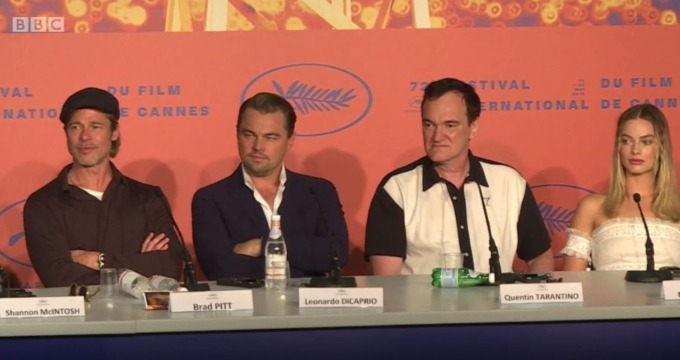
Quentin Tarantino‘s ninth film, Once Upon a Time… in Hollywood, will be released worldwide by late July. The movie is dramedy set in an alternate timeline that narrates the days leading up to the murder of actress Sharon Tate in August 1969 by Charles Manson‘s cult will be released; events are told through Tate’s neighbors — actor Rick Dalton and his stunt double Cliff Booth, played respectively by Leonardo DiCaprio and Brad Pitt.
The film premiered at the Cannes Film Festival in May and, during the press conference, Tarantino was hit with a trick question by New York Times correspondent Farah Nayeri, who wanted to know why Margot Robbie —who plays Tate in the film— did not have as many lines as her co-stars, implicitly suggesting that there was a deliberate bias on Tarantino’s part; the answer of the mind that has given us Reservoir Dogs, Pulp Fiction and Inglorious Basterds was categorical:
“I reject your hypothesis,” he replied.
Variety reports that the director responded with a “scowl” while “looking visibly upset.” Robbie, however, took the time to answer the question “tactfully.”
How anyone with a functional brain can accuse the creator of the two Kill Bill volumes of having or harboring any kind of misogynist or anti-woman bias is beyond me, but this is our world now.
I was already a Tarantino fan even before he refused to dignify Nayeri’s question with an answer, and this makes me admire him even more — the guy is not only capable of writing complexingly mind-blowing dialogues, but he also has enough integrity to flatly reject the Regressive Left’s intellectual bullying.
For those who are just coming in, political correctness has evolved from the already oligophrenic Bechdel test —which equated the lack of interactions between women in a movie with sexism—, and now has people counting the amount of dialogue and how many words each sex gets; yes, it’s a thing!
Anyone who has ever written a dialogue knows that characters’ relevance lies in what they say and not in how many words they are assigned. A character with a single line of absolutely intelligent dialogue could be the raison d’être of an entire book or movie, regardless of how many lines other characters are given.
This is why political correctness is a threat to cultural industries and artistic creation: demanding that works meet certain ‘moral’ requirements goes against the artists’ free expressions and it definitely has a negative impact on the contents, it sometimes may even result in censorship (or self-censorship).
While it is regrettable that someone whose job description essentially consists of defending free speech goes around the world asking ridiculous questions that only bring the state of affairs closer to censorship, we should celebrate answers like Tarantino’s and follow his lead whenever necessary.
Out of all the bad ideas in the world, allowing magical thinking to dictate content has to definitely be one of the worst, not far from religions. And to reject those hypotheses whenever they complain that their line was not toed seems like one of the best available answers.
(pic: BBC)
